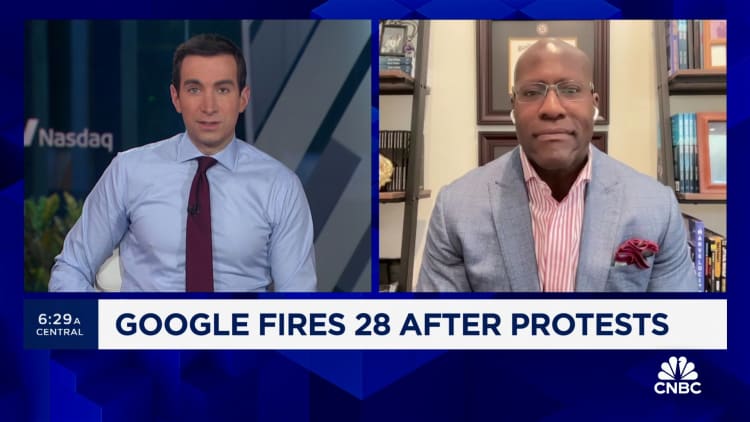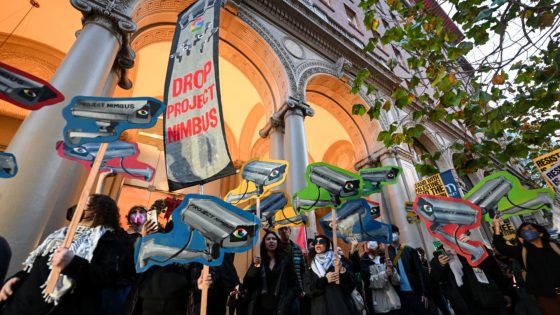Hundreds of protestors including Google workers are gathered in front of Google’s San Francisco offices and shut down traffic at One Market Street block on Thursday evening, demanding an end to its work with the Israeli government, and to protest Israeli attacks on Gaza, in San Francisco, California, United States on December 14, 2023.
Anadolu | Anadolu | Getty Images
Office politics have always been a point of frustration for workers, but now it’s politics in the office that’s getting to many American workers.
In an era during which more workers have felt emboldened to challenge bosses over politics â with the recent Google worker protests and arrests as a prime example â just under half of American workers polled by CNBC and SurveyMonkey say they would support a ban on political conversations at work.
Given the choice to ban a single topic from being discussed at work, 47% of workers overall choose politics, four times higher than pop culture (12%), AI (10%), and sports (9%), according to the bi-annual CNBC | SurveyMonkey Workforce Survey.
As protests over the Israel-Gaza war embroil major college campuses and led to the shutdown of the Columbia University campus earlier this week, the survey shows generational nuance on the topic. Younger workers show less hesitancy toward political discussions, with 41% of Gen Z workers saying they would choose to bar any political discussions at work. That’s lower than millennial workers (46%), Gen X workers (52%), and boomers (49%). That corresponding figure goes down to 39% for 18-24-year-olds specifically.
The youngest workers are generally the ones mostly likely to lack enthusiasm for their current work roles, the survey found, a trend that has been dubbed “resenteeism” at work.

“These findings paint a picture of the evolving U.S. workforce and highlight a growing gap between how workers actually work and how they’d prefer to work,” Lara Belonogoff, senior director of brand management and research at SurveyMonkey, said in a statement. “That gap and the unique behaviors of Gen Z to value meaningful work and embrace politics in the workplace may signal the start of a generational shift in workplace culture. Understanding these changes is crucial for businesses that want to attract, retain, and motivate their employees.”
The CNBC | SurveyMonkey online poll was conducted April 3-5 among a national sample of 5,993 workers in the United States.
In recent years, the percentage of workers who say politics has impacted them in the workplace has risen, according to research from the Society for Human Resource Management (SHRM). It found in a 2022 survey that 26% of workers said they personally experienced either positive and negative treatment at work related to politics. In 2019, only 11% of workers cited politics as a factor in treatment.
Workers do not have First Amendment protections inside the workplace that are equal to those outside of it, and employers have the ability to place “reasonable restrictions” on political discussions during work time.
Political discussion related to work conditions are a different legal issue. Under the National Labor Relations Act, Section 7, employees have the right to act together to improve wages and working conditions, and restrictions on speech do not necessarily carry over to break periods or break rooms.
Similar to the CNBC survey, a recent worker poll from ResumeHelp found that half of workers think political conversations hurt the workplace and don’t engage in them, while 45% regret having these conversations. Younger workers are more likely to have political conversations in the office, and be comfortable with it, its survey found.
The CNBC survey finds differences in the level of support for a workplace ban on politics by party identification, with Republican respondents the least likely to support a ban, at 42%. Independents (54%) and Democrats (50%) were more likely to cite politics as their choice.
Women (50%) were also slightly more likely than men (45%) to voice support. By race, white and Black Americans, at 49%, showed the highest levels of support for a ban on political talk at work. But among the decision makers â C-suite executives, owners, and vice presidents â support was much lower, at 39%, than among managers (48%) and individual contributors (49%)
Amid the intense debates taking place from Google to universities, more workers are back in offices â most of the time. The CNBC survey finds that 82% of workers say they are back in the office fully or most of the time â and most workers (70%) are okay with this work schedule. Meanwhile, the percentage of workers who are fully remote continues to decline, down from 20% to 16% over the past two surveys.

Source Agencies



